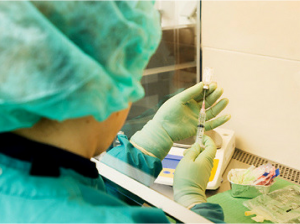 Clinical trials are essential for continuously improving patient outcomes and their quality of life. Medicines used in clinical trials need to be securely managed by trained personnel capable to pertain their storage, dispensing, return and destruction. Hospital pharmacists are members of the multidisciplinary team needed for safely managing clinical trials.
Clinical trials are essential for continuously improving patient outcomes and their quality of life. Medicines used in clinical trials need to be securely managed by trained personnel capable to pertain their storage, dispensing, return and destruction. Hospital pharmacists are members of the multidisciplinary team needed for safely managing clinical trials.
Within the European Union, clinical trials are governed by the Clinical Trials Regulation which harmonises the processes for assessment and supervision. This piece of legislation that entered into application in January 2022, also made the process for multinational trials more efficient due to the single online platform known as the Clinical Trials Information System (CTIS).
Clinical trials are complex and require the involvement of different healthcare professionals. Multidisciplinary cooperation is essential for their success. One of the key contributions of the pharmacist is the promotion of patient safety by collaborating in the development of a research protocol, reviewing as a member of an advisory committee, establishing mechanisms that contribute to safety, and assuring compliance with local and national regulations and standards. Hospital pharmacists are at the forefront of patient care and consequently also have a significant impact on patient management and thus should be further integrated into the work of ethics committees.
The position paper of EAHP touches on the role of hospital pharmacists in clinical trials, the involvement of different patient groups, the improvements in Europe’s clinical trial landscape and the role of ethics committees in clinical trials. EAHP
- encourages regulators to further improve training on clinical trials by anchoring it into both undergraduate and continuing education of pharmacists.
- recognises that not all patient groups are suitable candidates or fully represented in clinical trials. Where appropriate, efforts should be made – taking into account also all relevant constraints – to create clinical trials that also study the effects of new treatment options in diverse patient populations, so that also these groups could be provided with access to new medicines once approved
- underlines the importance of utilising the full potential of the EU Clinical Trial Regulation by swiftly putting all necessary measures in place at the national level to successfully transition to this new regime.
- urges the Member States to ensure that the role of ethics committees under the new Clinical Trial Regulation remains strong in the interest of clinical trial participants
In accordance with Section 6.5 of the European Statements of Hospital Pharmacy, the hospital pharmacist should be actively involved in clinical trials of medicines. However, despite the advantages of hospital pharmacy involvement in clinical trials, their pharmaceutical expertise is not yet fully utilised across Europe. Consequently, EAHP is calling on national governments to recognise the important roles that hospital pharmacists play in clinical trials by requiring their involvement to increase patient safety.
Read EAHP’s Position Paper on Clinical Trials HERE.
In June 2012, EAHP released a statement on clinical trials that commented on the revision of the clinical trial legislation in the EU.
EAHP’s response to the European Medicines Agency consultation on publishing clinical trial result information (September 2013) is available here and here.

EAHP also encourages hospital pharmacists and members of the public to sign the Alltrials petition calling for greater transparency in the reporting of clinical trials – sign the petition at https://www.alltrials.net/petition/
























 Clinical trials are essential for continuously improving patient outcomes and their quality of life. Medicines used in clinical trials need to be securely managed by trained personnel capable to pertain their storage, dispensing, return and destruction. Hospital pharmacists are members of the multidisciplinary team needed for safely managing clinical trials.
Clinical trials are essential for continuously improving patient outcomes and their quality of life. Medicines used in clinical trials need to be securely managed by trained personnel capable to pertain their storage, dispensing, return and destruction. Hospital pharmacists are members of the multidisciplinary team needed for safely managing clinical trials.